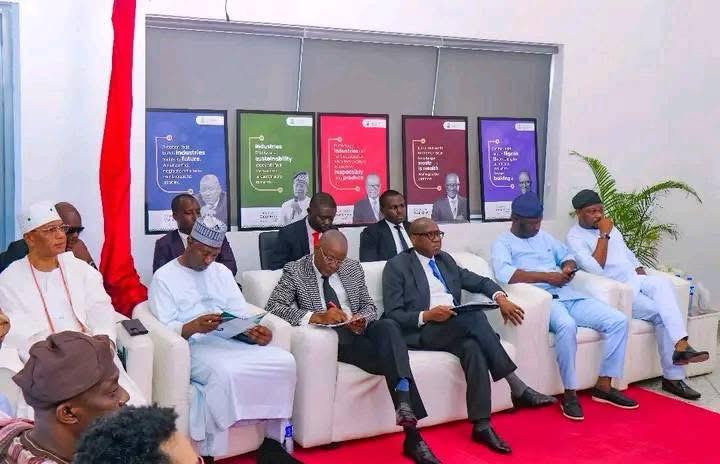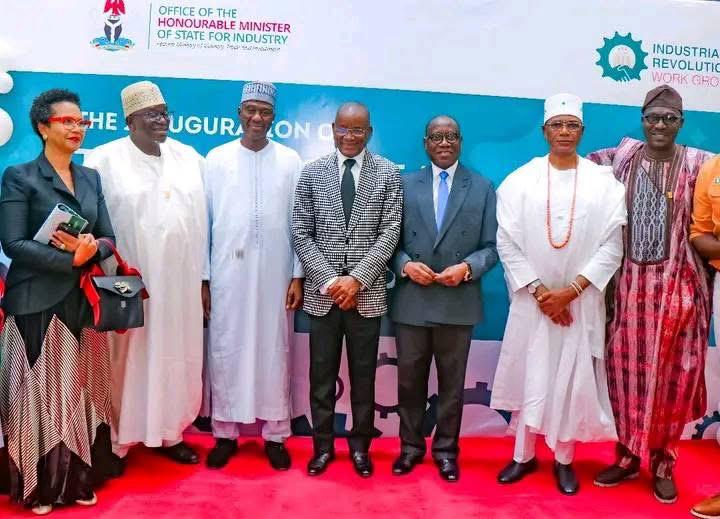When will Nigeria occupy her pride of her place as Africa’s largest, most advanced economy ? And when will she join the rank of major export based economies like Germany, exporting over 70 percent of her locally produced goods- whether manufactured products or otherwise ?
This all important question has dominated the minds of citizens and those who love the country. Therefore, when the Federal Ministry of Industry, Trade and Investments otherwise referred to as FMITI, inaugurated the Industrial Revolution Work Group (IRWG), for many it was a step in providing answers to these queries. Yet, for those who have been around the block for a long time, spanning administrations, the sound of the gong seemed to produce the rhythm of a dirge. They could only watch and hope that this is not business as usual. This group thinks that the taste of a budding is better cherished in the eating. As a financial expert once said in local pidgin English, “we go see.”
They could only watch and hope that this is not business as usual. This group thinks that the taste of a budding is better cherished in the eating. As a financial expert once said in local pidgin English, “we go see.”
And their somewhat skepticism cannot be quickly dismissed seeing that in 2014, the President Goodluck Jonathan administration launched the Nigeria Industrial Revolution Plan (NIRP). The policy was lauded at the time as clearly outlining what seemed as the A – Z of achieving national industrialisation.
But over a decade since the activation of the NIPR the country still remains largely dependent on imported manufactured products, while it expends precious forex exporting raw materials in a reversed economic fashion that creates jobs elsewhere, and shores up the Gross Domestic Product (GDP) of other nations.
 In the same vein, this economic kyphosis is responsible for the country’s balance of trade deficit, upsurge in crime, agitations, to list.
In the same vein, this economic kyphosis is responsible for the country’s balance of trade deficit, upsurge in crime, agitations, to list.
But did the NIPR fail in its mission of redefining the country’s industrial landscape ? (This piece is not about finding the answer to this question). However it is refreshing that the Federal Ministry of Industry, Trade and Investments (FMITI) would dig into the drawers, and carry on with the strategic, comprehensive and integrated roadmap to Nigeria’s industrialisation dreams.
The coming onboard of the Industrial Revolution Work Group (IRWG) under the able leadership of the Minister of State in FMITI, Senator John Owan Enoh, and to be piloted by the private and public sector would hopefully close the gaps left by the NIPR.
To start with, the initiative which hopefully would redefine Nigeria’s industrial landscape is a strategic think tank and war cabinet of the current administration led by President Bola Tinubu; and perhaps the formula would also be adopted by successive governments to give the country an industrial policy-topography that would be implemented in coming years.
Bear in mind that the IRWG is expected to accelerate industrialization, economic diversification, and manufacturing competitiveness with a view to revitalizing the industrial sector.
Hence, it was a welcome development for the former Minister for Industry, Trade, and Investment, Dr. Olusegun Aganga, to deliver the keynote address at the inauguration of the group where he highlighed the IRWG’s mission to position Nigeria as Africa’s leading industrial powerhouse through innovative policies, investment-driven strategies, and technology adoption.
For him, the IRWG would function as a one-stop shop for policy formulation, industry collaboration, and strategic intervention in Nigeria’s manufacturing and industrial sectors.
Granted this, the fundamental objectives of revitalizing moribund industries by conducting a nationwide industrial audit and implementing targeted revitalization strategies, enhancing global competitiveness and by supporting manufacturers in adopting advanced manufacturing technologies and increasing export capacity, are heartwarming.
Others are driving infrastructure and energy solutions by addressing key industrial bottlenecks such as power supply, logistics, and access to finance (some major setbacks that affected the performance of the NIPR) and promoting research and innovation by encouraging partnerships between industry and academia to foster local content development and industrial innovation.
As laudable as these focus remains, one cannot agree more with the Minister of State, FMITI, in his submission that “For too long, Nigeria’s industrial potential has been constrained by structural challenges and a fragmented policy approach. With the IRWG, we are building a powerful coalition that will drive sustainable, long-term industrial growth and ensure that ‘Made in Nigeria’ becomes a globally recognized mark of excellence.”
“Industry leaders and international partners welcomed the initiative, affirming their commitment to collaborating with the government to drive innovation, capacity-building, and industrial expansion.”
We therefore join President Tinubu, the Minister the Ministry, all stakeholders in insisting that the IRWG inauguration marks a new era of public-private collaboration in Nigeria’s industrial sector; manufacturers, investors, research institutions, and global partners must pull forces together to give this initiative the needed impetuce that would life Nigeria’s industrial sector to global prominence.


